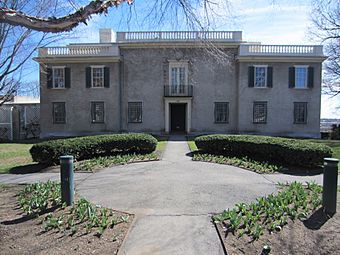The Hyde Collection facts for kids
Quick facts for kids |
|
|
Hyde House
|
|
 |
|
| Location | 161 Warren St., Glens Falls, New York |
|---|---|
| Built | 1910 |
| Architect | Henry Forbes Bigelow, H.F. Rhinelander |
| Architectural style | Classical Revival |
| MPS | Henry Forbes Bigelow Buildings TR |
| NRHP reference No. | 84003358 |
| Added to NRHP | September 29, 1984 |
The Hyde Collection is a cool art museum located in Glens Falls, New York. It's in a beautiful old house called Hyde House, which was once a family home. This house is so special that it's even listed on the U.S. National Register of Historic Places.
The museum was started by Louis and Charlotte Hyde. They collected amazing things like old furniture, books, paintings, sculptures, and pottery. Even though it's not a huge museum, it has a really impressive collection! You can see art from different times and places, including Italian Renaissance art and French antiques from the 1700s.
Some of the famous artists whose works you can find here include Botticelli, El Greco, van Dyck, Ingres, Raphael, Rembrandt, Rubens, Tintoretto, Cézanne, Degas, Matisse, Picasso, Renoir, and van Gogh. There are also important American artists like Eakins, Childe Hassam, Winslow Homer, Ryder, and Whistler.
Contents
History of the Hyde Collection
How the Museum Started
Charlotte Pruyn Hyde loved art and wanted to share her collection with everyone. In 1952, she set up a special plan to turn her home and art into a museum for the community. Her goal was to create a place where people could see art and learn more about it. She wanted it to be for the people of Glens Falls and anyone else who visited.
The Hyde art collection was put together during a special time, from about 1890 to 1940. This was a "golden age" when many wealthy people collected art for their private homes.
The Hyde Family Story
Charlotte Hyde (1867–1963) grew up in Glens Falls, New York. Her family was very important in the paper industry in the Adirondack Mountains area. Her father, Samuel Pruyn, started a paper company called Finch, Pruyn & Company in 1865. He became the only owner, which made his family very wealthy.
Charlotte met Louis Hyde (1866–1934) when she was studying in Boston. He was a law student at Harvard. They got married in 1901. A few years later, in 1906, Charlotte's father asked Louis to join the family business. So, Louis and Charlotte moved back to Glens Falls, and Louis became a vice president at the paper mill.
Building Hyde House
Between 1904 and 1912, Charlotte and her sisters, Nell Cunningham and Mary Hoopes, built their homes next to each other. Their houses overlooked the Hudson River. A famous architect from Boston, Henry Forbes Bigelow, designed all three houses.
Hyde House was finished in 1912. It was built in the style of a Florentine Renaissance palazzo, which is like a grand Italian palace. It's considered a very impressive example of this type of architecture in America.
Once Hyde House was ready, Louis and Charlotte started filling it with furniture and art that fit their new home. Over many years, they carefully bought more pieces during their trips to Europe and from art dealers in New York City.
By 1930, their collection was well-known. When Louis Hyde passed away in 1934, they had already gathered about one-third of their main collection. Charlotte continued to add to it for the next 30 years, collecting art from all across Western history. They even got help from a famous art expert named Bernard Berenson.
The Museum Opens and Grows
Just three months after Charlotte Hyde died in 1963, the Hyde Collection opened its doors to the public. In 1984, Hyde House was officially added to the National Register of Historic Places.
In 1989, the museum grew even more. A new part, designed by Edward Larrabee Barnes, connected Hyde House to the nearby Cunningham House, which the museum had recently bought. This new section added four galleries, an auditorium, art storage, classrooms, and a museum shop. This expansion helped the museum offer more to its visitors.
Today, this newer part of the museum hosts many special art shows. These shows feature different styles, time periods, and types of art. They might focus on one artist, like Winslow Homer or Auguste Rodin, or explore broader art themes. These special exhibits add to the art that is always on display in Hyde House.
In May 2004, the Hyde Collection finished a big project to make the museum even better. They completely fixed up the outside of historic Hyde House, replacing the stucco. Inside, they made sure the furnishings looked just like they did when the Hyde family lived there. This helped visitors feel like they were stepping back in time. In April 2010, Finch Paper bought the Glens Falls Armory, which is next to the Hyde Collection. This was done to possibly help the museum expand even more in the future.
See also
 | John T. Biggers |
 | Thomas Blackshear |
 | Mark Bradford |
 | Beverly Buchanan |





